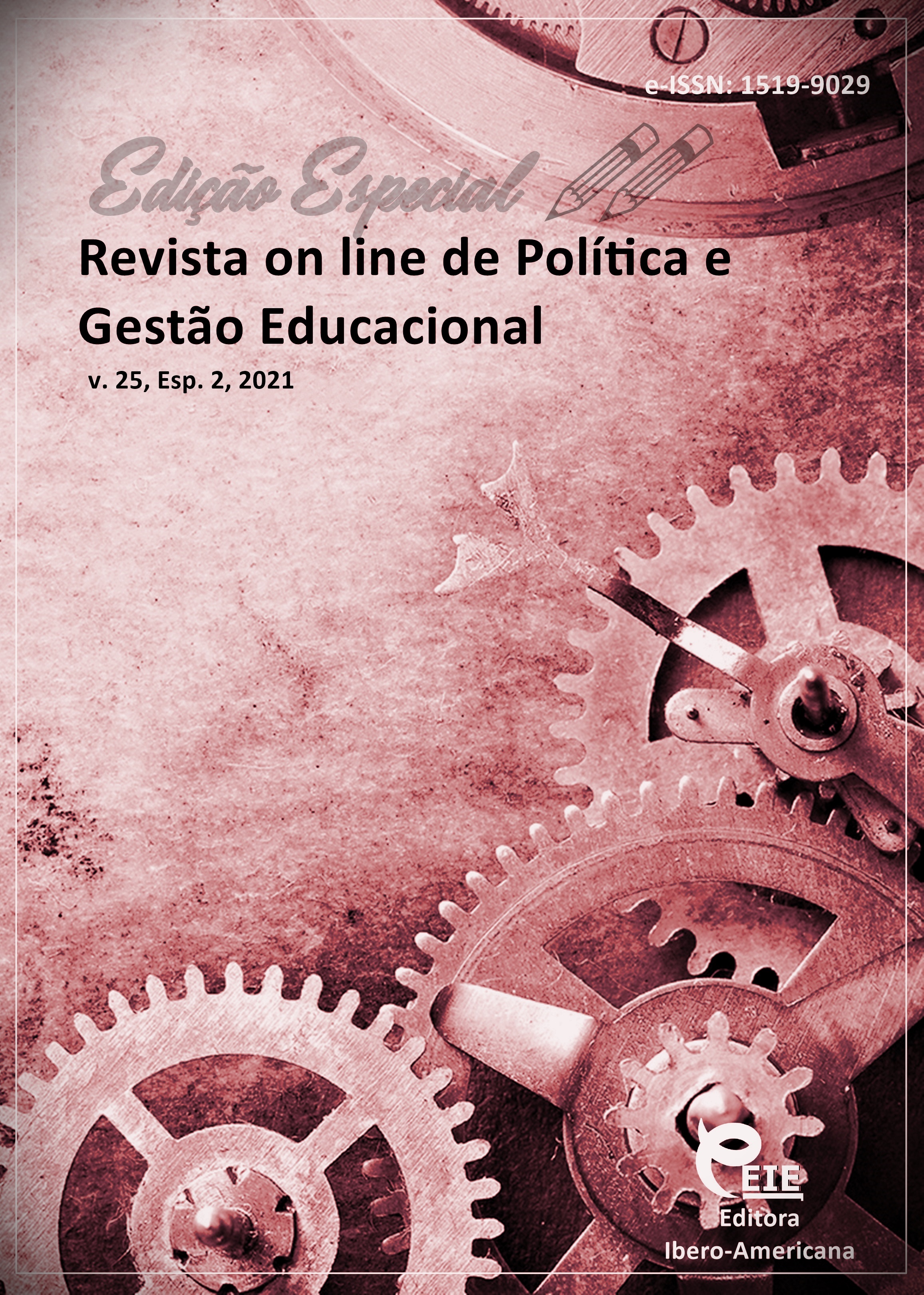Formação de preparação metodológica dos professores de tecnologia para a organização da atividade do projeto usando os recursos da plataforma de estágio
DOI:
https://doi.org/10.22633/rpge.v25iesp.2.15268Palavras-chave:
Plataforma de estágio, Desenvolvimento professional, Prontidão metodológica, Método de projetoResumo
Em relação às intensas mudanças no sistema de ensino geral, grande atenção é dada à modernização da educação tecnológica escolar. O surgimento de novas direções de design tecnológico para os alunos tornou obrigatório para os professores melhorar sua prontidão metodológica. Este artigo tem como objetivo determinar a eficácia da formação da prontidão metodológica dos professores de tecnologia para desenvolver a atividade de projeto de escolares utilizando os recursos da plataforma de estágio. Foram utilizados os seguintes métodos de investigação: preenchimento da ficha de diagnóstico ‘Avaliação da disponibilidade do professor para participar em atividades inovadoras’ (de acordo com a metodologia de V.A. Slastenin, L.S. Podymova); realização do questionário ‘Avaliação da prontidão do professor para o desenvolvimento profissional (de acordo com a metodologia de V.I. Zvereva, N.V. Nemova); realização do teste ‘Tecnologias educacionais modernas’ (de acordo com a metodologia de O.A. Ivanova); utilizando o método de avaliação dos produtos da atividade docente. Esses métodos tornaram possível determinar o nível de critérios motivacionais, cognitivos e de atividade da prontidão dos professores para organizar a atividade do projeto dos alunos. Para implementar o estágio, desenvolvemos: o programa; o modelo estrutural e de conteúdo da atividade docente; o manual educacional e didático; o método para estimar o nível de formação de ações educacionais universais em crianças em idade escolar durante a atividade de design com base no conceito de desenvolvimento de ações educacionais universais de A.G. Asmolov.
Downloads
Referências
ANISIMOVA, L. N. et al. Organizational and methodological foundations of innovative development of the system of retraining and advanced training of technology teachers at the university. Bulletin of the Moscow State Regional University, n. 3, p. 158-168, 2018.
BELKINA, V. N. Model of teacher training in the conditions of continuous professional education. Yaroslavl Pedagogical Bulletin, n. 4, p. 72-75, 2009.
DEMIDENKO, E. N. Internship platform as interactive form of broadcasting pedagogical practices. Manand Education, v. 4, n. 45, p. 139-142, 2015.
IMPEDOVO, M.; GINESTIER, J.; WILLIAMS, J. The challenge of technological education: the european perspective. 2017.
KAMALEEVA, A. R. System approach in pedagogy. scientific and pedagogical review. Pedagogical Worldview, v. 3, n. 9, p. 13-23, 2015.
KONYUSHNI, K. Design well-being: implications for pedagogy that develops design skills. Design and Technology Education: International Journal, v. 19, n. 1, 2014.
KOPOTEVA, G. L.; LOGVINOVA, I. M. Methodological readiness of education employees to implement the federal state educational standard of primary, basic, secondary (full) general education. Handbook of the Deputy Headmaster, n. 10, p. 8-12, 2011.
NASYROVA, E. F.; VASENINA, N. L. Assessment of Formation of the Students’ Universal Educational Actions in the Course of Project Activities at Technology Lessons. Science and School, v. 4, p. 112-117, 2016.
ORLOVA, L. V.; PECHINKINA, O. V. Modern teacher education in finland and sweden: structure and content. Bulletin of the Northern (Arctic) Federal University, n. 3, p. 149-157, 2015.
PANFILOVA, L. G.; SHILOVA, O. N. Interaction of participants in the educational process in the conditions of the internship platform. Man and Education, v. 4, n. 45, p. 108-114, 2015.
RETIVYKH M. V.; MATYASH N. V.; VORONIN A. M. Actual problems of technological education of schoolchildren and training of technology teachers. Bulletin of the Bryansk State University, v. 1, n. 31, p. 361-367, 2017.
SEREBRENNIKOV L. N.; MEYER K. D. State and Trends of Technological Education Development in Foreign Countries. Yaroslavl Pedagogical Bulletin, v. 2, n. 4, p. 47-54, 2014.
SERGIENKO, A. Y. Design of professional development of teachers using the experimental platforms in the education system of singapore. Man and Education, v. 4, n. 45, p. 134-138, 2015.
SINGAPORE. Centre for Development of Teaching and Learning. Continuous Professional Development Program. National University of Singapore, Singapore, 2015. Available: http://www.cdtl.nus.edu.sg/cpdp/. Access: 10 Feb. 2021.
VASILCHUK, G. T.; JONAS, I. V. Updating the content and forms of improving the professionalism of the teacher using the municipal methodological service in the context of introduction of the teacher’s professional standard. Teacher of Kuzbass, v. 4, n. 39, 2017.
ZHEGIN, P.A. Support for aspiring teachers: experience of australia, new zealand, and ireland. Pedagogical education in Russia, n. 2, p. 238-245, 2011.
Downloads
Publicado
Como Citar
Edição
Seção
Licença
Copyright (c) 2021 Revista on line de Política e Gestão Educacional

Este trabalho está licenciado sob uma licença Creative Commons Attribution-NonCommercial-ShareAlike 4.0 International License.
Manuscritos aceitos e publicados são de propriedade da Revista on line de Política e Gestão Educacional. É vedada a submissão integral ou parcial do manuscrito a qualquer outro periódico. A responsabilidade do conteúdo dos artigos é exclusiva dos autores. É vedada a tradução para outro idioma sem a autorização escrita do Editor ouvida a Comissão Editorial Científica.











